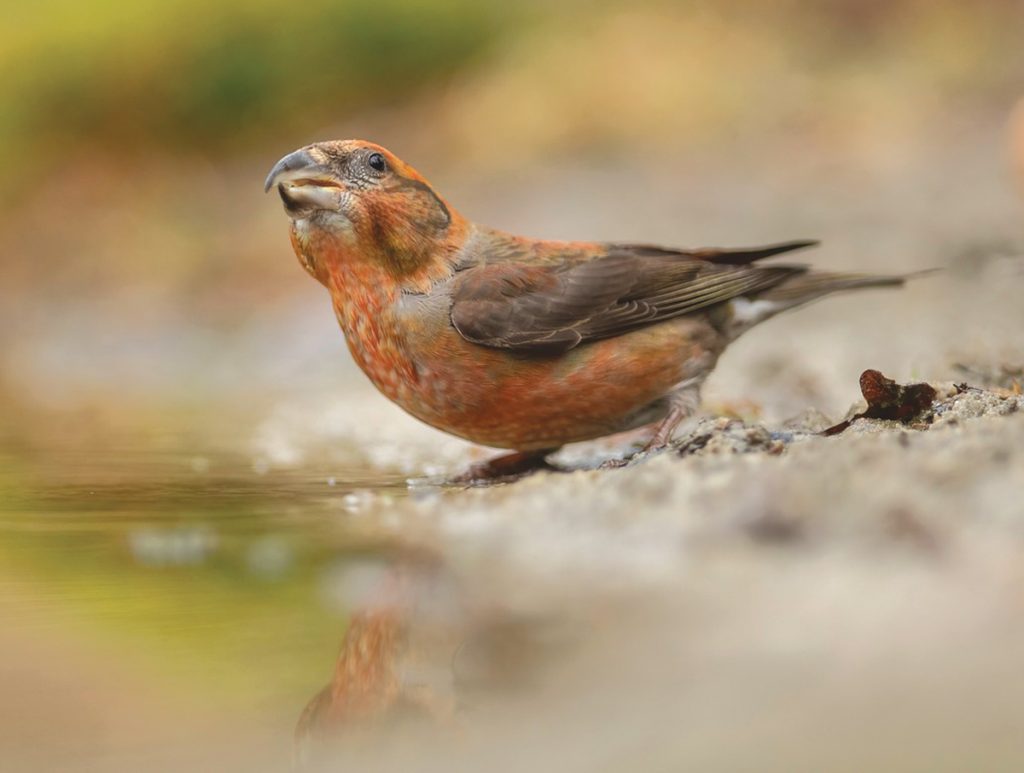Hawthorn Hill Journal by Richard deRosa
On Crossbills and Being…

No walk is ever the same. Anyone who walks with any regularity, especially if one’s route is often the same, knows that to be true. The act of walking is, in many respects, an odyssey of sorts. One hits the road for the exercise, but more importantly for the thrill of the journey, however short or long or arduous. No walk ends without one having experienced an unexpected insight or revelation of some sort. Or, perhaps something happens that triggers a new way of seeing things. That happened to me the other day after watching four red crossbills chatting with one another in the uppermost branches of a very tall tree.
I had never seen or heard red crossbills before. That in and of itself was pretty darn exciting. Birders refer to such an occasion as having added a ‘life bird’ to one’s list. I gave up listing a long time ago. Lists have a way of getting tucked away and rarely, if ever, referred to. I, so far, am able to remember where I have seen a bird for the first time. As long as my memory holds out, that suffices. I have transitioned to a practice that at this time of my life feels much more natural and comfortable. I take my binocs with me when I walk, but my focus is on the walk, its gentle, invigorating, repetitive motions the primary catalyst for mindlessness in motion. I am aware of my surroundings, but most captivated by the interior world of unfettered thought. I have heard many accounts of walkers who testify to the uncanny way that a walk so often provides solutions to previously recalcitrant problems. It is so often true that things or answers looked for appear when one is not consciously on the hunt. That has been true for me many times. It is as if the mere act of walking opens doors to thought hitherto locked. It is similar, I think, to how some seeds lie dormant beneath the soil for years before conditions are ripe for their coming to life. Walking seems to loosen whatever inner binds fetter free thinking.
Looking at those crossbills, I wondered what they might be talking about. Perhaps a silly notion, but every species on earth speaks or gestures or thinks a language of some sort. Given the time of year and the fact that they prefer more northern climes, I suspect they were plotting their itinerary according to the availability of their primary food source, conifer cones. They have a nifty way at getting at conifer seeds using those crossed bills as fulcrums. That aside, as I looked at them, and they only stayed for about five minutes, it struck me that every walk or journey is essentially a search for something. And it may not always be for something as concrete as mere sustenance. It could also be, perhaps unconsciously, a search for meaning. Or, a search for an answer to this question: Where do I fit within this vast, unfathomable cosmos? What is my place in nature’s intricate web? It also occurs to me that walking also helps one answer this existential question: “Who am I?” I cannot speak for other walkers. I do know that when walking, I find myself asking myself questions about myself that are rooted in decisions I have made that might have been more adroitly arrived at, or moral dilemmas that have escaped an acceptable form of closure.
The other thing those lovely red birds reminded me of was the impossibility of ever really understanding what we refer to as the “other.” We could scrutinize one another for an infinity of lifetimes and never bridge the gaps that separate us. We will always remain mysteries to one another. Collect data on any bird you like, or any person for that matter, and you will only scratch the surface of that individual’s being. We’re stuck with surfaces; nothing can be done about that. No matter how much time and effort one might devote to studying a crossbill, one will never know what being a crossbill is all about. Same goes for each of us. I happen to value mystery. Someone once pointed out to me that one can hold up any object, turn it round and round, but seeing it in its entirety is impossible. Same goes for each of us.
When the weather dampens hopes for a walk outside, I will often walk our treadmill. Listening to a book helps pass the time. Much as a book makes for a more bearable walk, there are times when I drift off without realizing it. A very pleasant state. Of course, one must be careful to keep one’s eyes on the road. A few days ago, red crossbills were that walk’s surprise catalyst. The joy is in not knowing what the next walk will bring. If it is a slow day, just walking will suffice.
Dick deRosa’s Hawthorn Hill essays have appeared in “The Freeman’s Journal” since 1998. A collection, “Hawthorn Hill Journal: Selected Essays,” was published in 2012. He is a retired English teacher.

